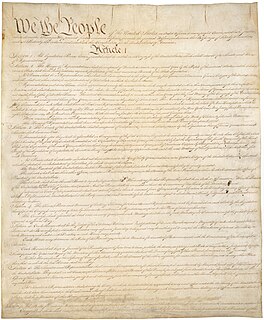A motion for more definite statement in many jurisdictions in the United States, and under United States federal law, is a means of obtaining a more detailed motion from the opposing party in a civil case before interposing a responsive pleading.
Jurisdiction is the practical authority granted to a legal body to administer justice within a defined field of responsibility, e.g., Michigan tax law. In federations like the United States, areas of jurisdiction apply to local, state, and federal levels; e.g. the court has jurisdiction to apply federal law.

The United States of America (USA), commonly known as the United States or America, is a country comprising 50 states, a federal district, five major self-governing territories, and various possessions. At 3.8 million square miles, the United States is the world's third or fourth largest country by total area and is slightly smaller than the entire continent of Europe's 3.9 million square miles. With a population of over 327 million people, the U.S. is the third most populous country. The capital is Washington, D.C., and the largest city by population is New York City. Forty-eight states and the capital's federal district are contiguous in North America between Canada and Mexico. The State of Alaska is in the northwest corner of North America, bordered by Canada to the east and across the Bering Strait from Russia to the west. The State of Hawaii is an archipelago in the mid-Pacific Ocean. The U.S. territories are scattered about the Pacific Ocean and the Caribbean Sea, stretching across nine official time zones. The extremely diverse geography, climate, and wildlife of the United States make it one of the world's 17 megadiverse countries.
In legal terms, a plea is simply an answer to a claim made by someone in a criminal case under common law using the adversarial system. Colloquially, a plea has come to mean the assertion by a defendant at arraignment, or otherwise in response to a criminal charge, whether that person pleaded guilty, not guilty, no contest, Alford plea or no case to answer.
In federal jurisprudence, the motion is permitted by Rule 12(e) of The Federal Rules of Civil Procedure. The presiding judge will respond either by granting the motion or striking it from the record if it is found to be without legal merit. The motion must contain a point-by-point rebuttal, with each point numbered, and ideally should reference some case law in support of the motion.
The Federal Rules of Civil Procedure govern civil procedure in United States district courts. The FRCP are promulgated by the United States Supreme Court pursuant to the Rules Enabling Act, and then the United States Congress has seven months to veto the rules promulgated or they become part of the FRCP. The Court's modifications to the rules are usually based upon recommendations from the Judicial Conference of the United States, the federal judiciary's internal policy-making body. Although federal courts are required to apply the substantive law of the states as rules of decision in cases where state law is in question, the federal courts almost always use the FRCP as their rules of civil procedure.

A judge is a person who presides over court proceedings, either alone or as a part of a panel of judges. The powers, functions, method of appointment, discipline, and training of judges vary widely across different jurisdictions. The judge is supposed to conduct the trial impartially and, typically, in an open court. The judge hears all the witnesses and any other evidence presented by the barristers of the case, assesses the credibility and arguments of the parties, and then issues a ruling on the matter at hand based on his or her interpretation of the law and his or her own personal judgment. In some jurisdictions, the judge's powers may be shared with a jury. In inquisitorial systems of criminal investigation, a judge might also be an examining magistrate.
In the Commonwealth of Virginia, a motion seeking such relief is called a motion for a bill of particulars.

Virginia, officially the Commonwealth of Virginia, is a state in the Southeastern and Mid-Atlantic regions of the United States located between the Atlantic Coast and the Appalachian Mountains. Virginia is nicknamed the "Old Dominion" due to its status as the first English colonial possession established in mainland North America and "Mother of Presidents" because eight U.S. presidents were born there, more than any other state. The geography and climate of the Commonwealth are shaped by the Blue Ridge Mountains and the Chesapeake Bay, which provide habitat for much of its flora and fauna. The capital of the Commonwealth is Richmond; Virginia Beach is the most populous city, and Fairfax County is the most populous political subdivision. The Commonwealth's estimated population as of 2018 is over 8.5 million.
In common law jurisdictions, a bill of particulars is a detailed, formal, written statement of charges or claims by a plaintiff or the prosecutor given upon the defendant's formal request to the court for more detailed information. A bill of particulars may be used in either criminal defense or in civil litigation.





